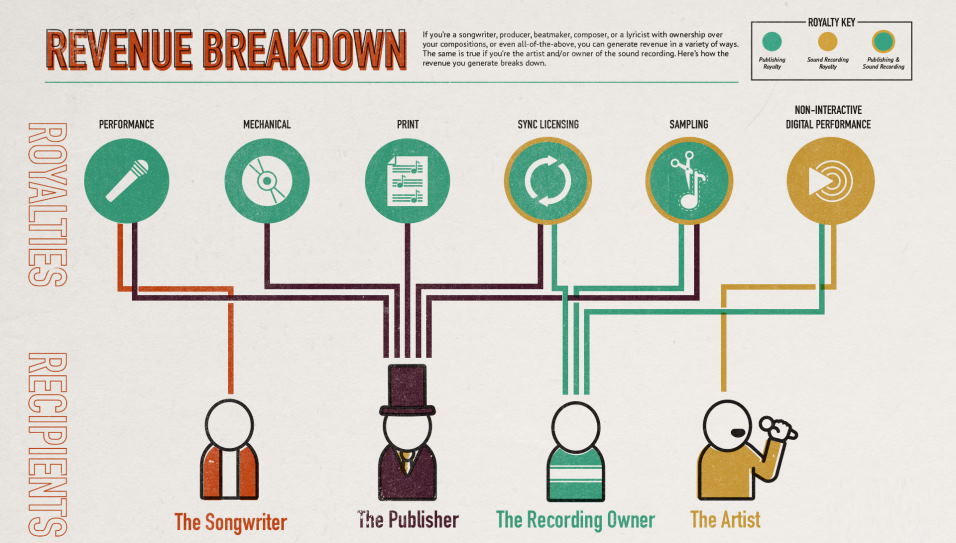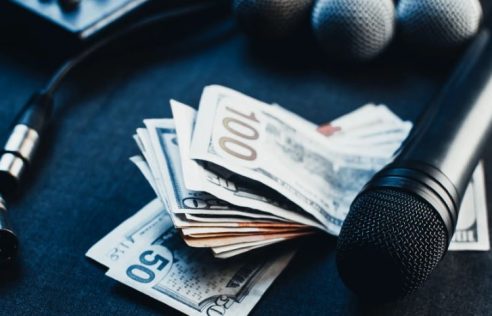Understanding music royalties can be complex, but knowing how they work is important if you’re a musician looking to make a living off your craft. In this blog post, we’ll break down everything you need to know about music royalties, from what they are to how they’re calculated. Whether you’re just getting started in the music industry or you’ve been around for awhile, this is essential information for anyone hoping to make a career out of their passion. So let’s dive in and learn all about music royalties!
What are music royalties, and how do they work?
When a song is played on the radio, streamed online, or performed live, the artist who created the music earns performance royalties. These royalties are collected by organizations like ASCAP and BMI in the US, and PRS for Music in the UK. The money is then distributed to the songwriters and publishers based on how often the song is played.
If a song is used in a TV show, film, or commercial, the artist can earn what are called sync royalties. In order to use a song in this way, the production company must get permission from the copyright holder (usually the publisher) and pay a fee. The fee amount depends on several factors, including how well known the song is and how big a part it plays in the production.

Songwriters and composers can also earn royalties from the sale of recordings of their work (called mechanical royalties), and from the use of their music in public places (called public performance royalties).
In the US, these royalties are collected by the Harry Fox Agency. In the UK, they’re collected by PRS for Music.
As you can see, there are a lot of different ways that artists can earn money from their music. And, as you might expect, it can be confusing to keep track of all the different types of royalties and who collects them. But luckily, there are organizations like ASCAP, BMI, PRS for Music, and the Harry Fox Agency that help ensure that artists are paid for their work.
Functions of music royalties
Music royalties are payments made to songwriters, composers, producers, and performers for the use of their musical work. The most common form of payment is a performance royalty, which is paid to the artist whenever their music is played on the radio, in a live venue, or via digital streaming services. In addition, songwriters and composers typically receive a mechanical royalty whenever their songs are reproduced on CDs or vinyl records. Production royalties may also be paid to producers and engineers involved in the recording process.
Performance royalties are generally calculated as a percentage of the total revenue generated from music sales or airplay. The rate is set by performing rights organizations (PROs), such as ASCAP or BMI in the United States, or SOCAN in Canada. The PROs then distribute the royalties to their members, typically songwriters and composers.

Mechanical royalties are calculated as a per-song or per-recording rate, and are paid to the copyright holder whenever a song is reproduced on a physical format, such as a CD or vinyl record. The Harry Fox Agency sets the rate in the United States or CMRRA in Canada.
Production royalties are typically paid to producers and engineers involved in the recording process and are calculated as a percentage of the retail price of the finished product. These payments are not always made directly to the artist; in some cases, they may be withheld by the record label as part of the advance paid to the artist.
Music royalties can be a significant source of income for artists, especially those who write their own songs and control the copyright to their work. They can also provide a steady revenue stream for established artists whose back catalogues are still generating sales or airplay. For newer artists, music royalties can help offset the cost of recording and promoting their music.
The above is a general overview of music royalties. The rules and rates vary depending on the country, type of royalty, and other factors. Artists should consult with a professional if they have questions about specific royalty payments.


